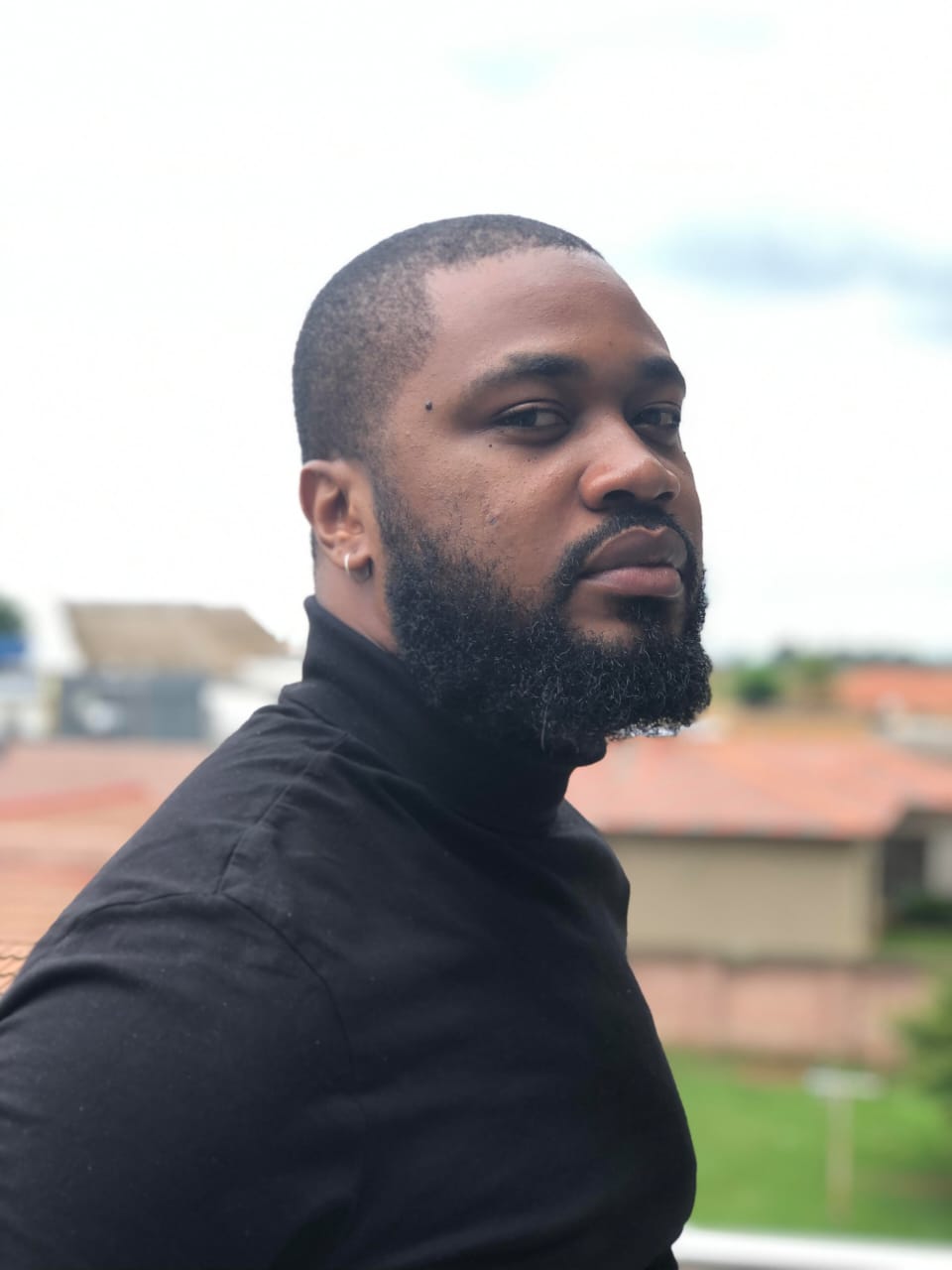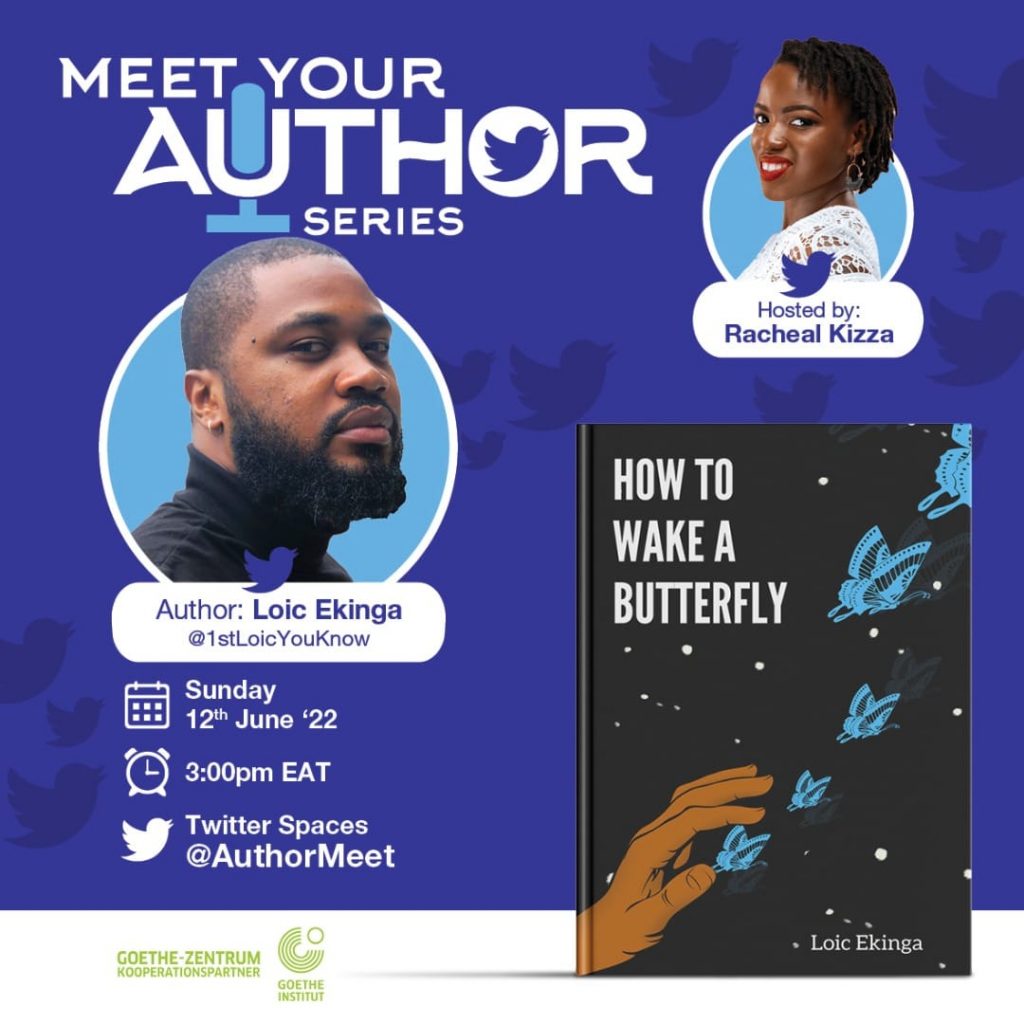
I had the pleasure of hosting Congolese writer and poet Loic Ekinga during season one of the Meet Your Author Series between June and July on Twitter Spaces. We discussed his poetry chapbook, How to Wake a Butterfly (Odyssey Books, 2021). Here is an interview I conducted with him via email.

Racheal Kizza (Racheal): Congratulations on the publication of your chapbook, How to wake a butterfly. What is it about?
Loic Ekinga (Loic): How To Wake a Butterfly is a collection about healing, transformation and growth. In it, I tried to free myself of the many things I felt held me down by questioning the person I am and how I became the man I am today.
Racheal: Was How to Wake a Butterfly the initial title or did it evolve to what it is now?
Loic: The title changed as the themes evolved. I just kept writing and the more poems I wrote, my thought patterns became clear. I knew what I was ultimately trying to say in the book.
Racheal: The title subtly demands that one pauses and reflects. Was this your aim?
Loic: The title is an answer to a question I looked for as I was writing. I knew that I needed to move away from the place I was at the time, mentally and otherwise and also, I’m always fascinated by the metaphor that is a butterfly’s life. It just felt right. I hoped the reader would be curious to find the answer to this question too.
Racheal: Tell us about getting the book published. What was the process like?
Loic: After the manuscript was done, I went on Submittable and looked for publishing houses that were taking poetry submissions. Odyssey Books answered my call and it’s been a beautiful journey with them ever since.
Racheal: How did you get into writing poetry?
Loic: My French teacher in Congo introduced me to it. I admired him so much, I think that helped. Before he taught that class in poetry, I didn’t know that poetry existed. He really opened my eyes to the most beautiful way to use language. I went home and immediately tried my hand at it and I just couldn’t stop.
Racheal: What are your favourite poems in How to Wake A Butterfly?
Loic: This question is always a difficult one to answer. Whenever someone tells me that they liked a certain poem or that it’s their favourite, I’m always like “oh yeah, it’s mine too!” I can’t help it. But for the sake of this interview, I’d say Cicada and My Father: A Lesson In Silence. between the two.
Racheal: We learn a lot from our parents and your poem, A quick lesson in Silence and others in the book, shows your relationship with your father. What was it back then, what is it like now and do you think you understand him now that you`re older?
Loic: I think I understand myself better now by observing him. My father is very much still a quiet and stubborn man and in many ways, I feel I am an extension or a variation of him. I understand manhood better too. not him, forcibly, but manhood and what it widely exists as. how that contributes to how many men perceive themselves and the world. When I was a child, my dad didn’t speak much and that hasn’t changed but now I think I understand why.
Racheal: The chapbook comes off like a walk down memory/ emotional lane. What was the creative process like since you wrote it in the heart of COVID-19? How was it dealing with the pandemic and emotional trauma?
Loic: I was cooped up in a single room, in a commune for three months. Adjusting to life and the solitude/loss I experienced. It was too much pain for me to endure and I realised that the best way for me to deal with it was to look within, to understand what I needed to address in order to heal or move on. The book is written in this manner because I wanted to peel the layers of my grief (one by one). So I went to the very beginning—to my childhood and journeyed towards the single room and beyond. probing, examining and healing.
Racheal: Why use poetry to go down memory lane?
Loic: Poetry has always been my closest friend. It’s been the kindest form of self-expression to me. It was a no-brainer. I knew that I could use its devices and grace to “simplify” my experience, my grief.
Racheal: Why did your mother leave? How did that affect you and where are you now?
Loic: She left for us. That’s the simplest way to put it. I am at a place where I understand. I don’t understand parenthood and the decision a parent has to make, however mutilating as one poem in the book suggests, but I appreciate her for dreaming of a certain world for us her sons and making decisions to provide it for us.
Racheal: Vulnerability is a continuous theme in your poems. You’re defying societal norms that tell boys not to cry, love flowers, wear pink, etc. Why is it important to you and your work?
Loic: Because the opposite feels unnatural to me. None of the things that get boys labelled as weak or ‘feminine’ is inherently harmful to anyone in my opinion. Before we were told anything, many of us boys were just children, you know. No roles were attributed to us until they were and mostly with no concrete explanation. We could have learned responsibility or strength without being told that that’s what differentiates us from girls. Men are topping the suicide charts, it’s killing us. I wanna talk about it, I really do. I’m still unlearning many of those things but I feel like we should have these conversations, if not for us, for our sons.
Racheal: Would you also call yourself a social activist since this body of work deals with toxic masculinity?
Loic: I don’t know. But I feel and understand the importance of being vocal about it. I think it’s a love language, liberation is a love language. if that’s what makes one an activist then maybe… maybe.
Racheal: In the book, there is a contrast between old and new love. The old love seemed to open you up to a world of trauma and pain but the new love brings forth healing in the face of the trauma and pain. Has this affected the way you view and experience love?
Loic: Love has always been home for me. And I understood that as I was writing this book and observing the dynamics in my current relationship. home is important, home is culture and identity. The way love is presented and experienced has a big bearing on our identity as people. I value that. I value love.
Racheal: Are you currently working on any projects?
Loic: Yes, I am. It’s very early to give a clear and definitive answer but I am.
Racheal: Lastly, what do you want people to take away when reading How to Wake a Butterfly?
Loic: Your experience is true and valid.
This is my first time pay a quick visit at here and i am really happy to read everthing at one place
I am truly thankful to the owner of this web site who has shared this fantastic piece of writing at at this place.
naturally like your web site however you need to take a look at the spelling on several of your posts. A number of them are rife with spelling problems and I find it very bothersome to tell the truth on the other hand I will surely come again again.
It’s really a nice and useful piece of info. I’m glad that you shared this useful info with us. Please keep us informed like this. Thanks for sharing.
Very well presented. Every quote was awesome and thanks for sharing the content. Keep sharing and keep motivating others.
Very well presented. Every quote was awesome and thanks for sharing the content. Keep sharing and keep motivating others.
Great information shared.. really enjoyed reading this post thank you author for sharing this post .. appreciated
Very well presented. Every quote was awesome and thanks for sharing the content. Keep sharing and keep motivating others.
This was beautiful Admin. Thank you for your reflections.
Good post! We will be linking to this particularly great post on our site. Keep up the great writing
I really like reading through a post that can make men and women think. Also, thank you for allowing me to comment!
I’m often to blogging and i really appreciate your content. The article has actually peaks my interest. I’m going to bookmark your web site and maintain checking for brand spanking new information.
I think the content you share is interesting, but for me there is still something missing, because the things discussed above are not important to talk about today.
I appreciate you sharing this blog post. Thanks Again. Cool.
Nice post. I learn something totally new and challenging on websites
I appreciate you sharing this blog post. Thanks Again. Cool.
I very delighted to find this internet site on bing, just what I was searching for as well saved to fav
I like this web blog very much, Its a really nice spot to read and obtain information.
Awesome! Its genuinely remarkable post, I have got much clear idea regarding from this post
Great information shared.. really enjoyed reading this post thank you author for sharing this post .. appreciated
I gotta favorite this web site it seems very helpful invaluable
Yeah bookmaking this wasn’t a risky decision outstanding post!.
You’re so awesome! I don’t believe I have read a single thing like that before. So great to find someone with some original thoughts on this topic. Really.. thank you for starting this up. This website is something that is needed on the internet, someone with a little originality!
Great information shared.. really enjoyed reading this post thank you author for sharing this post .. appreciated
Some truly excellent info , Gladiolus I noticed this.
Great information shared.. really enjoyed reading this post thank you author for sharing this post .. appreciated
Good post! We will be linking to this particularly great post on our site. Keep up the great writing
very informative articles or reviews at this time.
This is my first time pay a quick visit at here and i am really happy to read everthing at one place
I just like the helpful information you provide in your articles
I think this post makes sense and really helps me, so far I’m still confused, after reading the posts on this website I understand.
Pretty! This has been a really wonderful post. Many thanks for providing these details.
You’re so awesome! I don’t believe I have read a single thing like that before. So great to find someone with some original thoughts on this topic. Really.. thank you for starting this up. This website is something that is needed on the internet, someone with a little originality!
This was beautiful Admin. Thank you for your reflections.
Nice post. I learn something totally new and challenging on websites
Reading your article has greatly helped me, and I agree with you. But I still have some questions. Can you help me? I will pay attention to your answer. thank you.